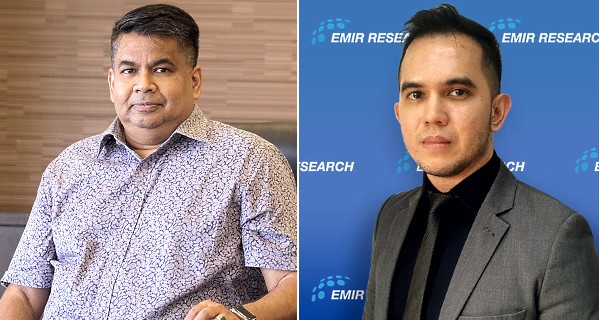
In Part 1, EMIR Research elaborated on strategies surrounding the enhancement of Malaysia’s strengths and potential diversifications, formulated with the global outlook in mind.
We took into account Malaysia’s financial position and the need to increase revenue streams in order to improve socioeconomic stability and the urgent need to address national security needs.
However, these must be supported by addressing Malaysia’s weak areas, which entail reforms, instilling new governance culture and cost-cutting measures to complement the task of generating new revenue streams.
These gaps are mostly foundational, therefore essential to the success of other strategies.
Addressing these gaps not only fulfills the necessary prerequisites but also overlaps with the creation of unrealized opportunities and the optimization of under-realized ones.
The Gaps and Corresponding Opportunities
1. Institutional reforms and good governance will be key. As highlighted in Part 1, major structural reforms will need to be undertaken to ensure justice, equity, talent availability and good governance—without which no policies and strategies can hope to be successfully and sustainably implemented.
Policies must move to needs-based policies, instead of discriminatory, arbitrary and knee-jerk policies.
Malaysia must work towards the separation of powers, radical transparency and sever the collusion between politics and business (political financing act etc.).
Internalization and practice of new governance culture, including the prioritization of know-how instead of know-who, appointing the right people and right places, an all-out war and stern rejection against corruption, system-wide radically-transparent and governance structure and digital transformation to ensure institutions are independent, empowered and transparent.
As widely promoted by EMIR Research, there must be total implementation of the Input-Output-Outcome-Impact (IOOI) model for assessments as well as a more holistic measurement of key performance indicators (KPIs).
A fitting complement to this would be a new spending culture where the government and industry players commit to efficient and frugal public spending, using Malaysia’s vital resources more effectively and limiting waste.
2. Proper and holistic digital transformation in the public and private sectors faces headwinds from existing bureaucracies and cost issues.
The government should seek to expand the variety of digital services that can/must be digitalized to reduce severe inefficiencies (delays, costs) and cut tedious bureaucracy.
Proper digital transformation should result in a system-wide radical transparency which helps address governance issues, paving the way for Malaysia to move towards cutting the bloated size of our civil service which greatly reduces government costs.
This is a key complement to increasing government revenue.
Effective digital transformation would also allow easier generation of Big Data for data-driven needs-based policy making.
Malaysia must also ensure sufficient financial, regulatory and manpower support to help SMEs to embark on digital transformation as 98% of Malaysia’s businesses are SMEs.
Embarking on digital transformation and adhering to sustainability matrices require upfront capital costs, time and talent.
On this note, EMIR Research calls for overhauling the transparency in the financial support system, particularly the grant ecosystem to remove “grantpreneuers” grant “cartels” and to implement the IOOI model to track the implementation and use of funds.
Supporting nationwide digitalization efforts are the telecommunications and digital infrastructure where Malaysia should maximize its 4G infrastructure while properly rolling out 5G.
As EMIR Research has highlighted in numerous publications, investigating the experience in other countries has shown that the single wholesale network (SWN) and “supply-driven” models as failed cases aside from outliers.
The rollout must be competitive, with efficient and maximized spectrum allocations instead of a monopolized spectrum middleman (e.g., DNB) to ensure the best outcome for the people and to avoid a single point of failure in the infrastructure.
Getting this wrong can have a dead-weight effect with generational repercussions and losses surpassing potential economic multipliers in specific sectors.
The outcome thereof is a weak and shallow industry infrastructure directly resulting in losses in existing and future investments.
Malaysia’s leaders must realize that this is a matter of building (and owning) the proper “highway of the digital future” which is akin (if not more or equally important) to physical economic trade routes.
3. Overhauling the education system is key to Malaysia’s foundation and future as it holds significant influence in addressing the three biggest underlying causes of many of Malaysia’s problems: unity, talent and morality.
Malaysia must review and address the practice of ethnic segregation and cultural indoctrination of vernacular schools as these are antithetical to unity.
Ethics and morality must be made as central pillars where respect, justice for all, abhorrence of corruption of all kinds and the rejection of racism and other forms of discrimination must be a central topic throughout Malaysia’s education system.
To support the innovation agenda’s need for a sustainable supply of talent, the decline in science-technology-engineering-mathematics (STEM) education and uptake must be addressed and a deep interest in innovation must be instilled from a young age.
At the tertiary level, KPIs must be revised to prioritize practicality, real-world impacts and applications instead of publications for publication’s sake, which ends up collecting dust.
One of the objectives of the innovation agenda is to avoid being digitally or technologically “colonized.”
Malaysia must transition from a mere technology adopter to efficient/productive users and ultimately as a competitive producer in the global market.
4. Reforms to reverse the severe “brain drain” phenomenon will be crucial as there is no point if the very few good talents coming out of a troubled education system leaves the country.
Sustaining innovation, driving businesses and implementing policies—all require a steady supply of good talents.
In addition to revising the pay scale to be more competitive and empathetically reflective of increased living costs, it is equally important to address structural reforms that would eliminate discrimination and upholds justice and equity.
5. Protection of biodiversity, flora and fauna, and natural resources will be essential as these are under serious deterioration despite Malaysia being a country that is highly dependent on them.
Protecting Malaysia’s natural resources must come under National Security provisions where water, water resources (catchment areas, water bodies such as lakes, rivers, oceans, etc.) and biodiversity (in the various types of natural ecosystems such as rainforests) to be protected as National Security assets via legal and physical enforcement.
These are parts of the world’s “lungs” and according to the World Wildlife Foundation (WWF), forests in the highlands help provide a continuous supply of clean water while the wetlands host a variety of natural ecological and hydrological functions—important roles for the supply and purification of water as well as controlling flood.
According to the WWF, 97% of our raw water supply for agricultural, domestic and industrial needs is derived primarily from rivers.
Despite this crucial importance, there have been repeated cases of industries dumping waste into the rivers.
These have caused serious ripple effects where industries and people are deprived of water supply.
Past studies have shown that more than half of Malaysia’s rivers are not “clean” and that the percentage of clean rivers was declining.
In the Global Food Security Index (GFSI) 2022, Malaysia once again garnered the highest risk rating of 5 for agricultural water risk, well above the world average risk score of 3.3, indicating serious water pollution.
The high levels of pollution in Malaysia’s waterways impact the country’s ability to produce food as 70% of the country’s water resources are for agriculture.
In the Global Food Security Index (GFSI) 2022, Malaysia retains its “very weak” score at a mere 27.6% in the “oceans, rivers and lakes” indicator which is critically below an already-low world average score of 41.2%.
This has serious impacts on the fisheries and tourism industries, with potentially harmful domino effects on the biological food chain, the ecology and the larger impact on local climate regulations and many more.
Thus, it is clear that the protection of biodiversity, flora and fauna, and natural resources is the protection of Malaysia’s lifeline.
6. Malaysia’s National Carbon Registry is an untapped opportunity from Malaysia’s rich biodiversity.
Malaysia has great potential as a carbon hub compared to its neighbors because of the existing and increasing demand for carbon offsets from industries as well as supply.
Malaysia can supply carbon credits from nature-based sustainability solutions like reforestation, renewable projects (solar and hydro) and the implementation of other carbon sequestration methods.
This will require the revival and digitalization of the National Carbon registry and to invite native digital standards bodies to connect to the registry.
As the world is pushing towards sustainability, Malaysia holds great opportunities to serve this growing market.
ReportLinker Research estimated the Global Carbon Credit market in 2021 at a value of USD 760.28 billion with a growth forecast (CAGR) of 21.14% during the forecast period of 2023-2028.
7. Revitalization of the biotechnology agenda will be needed to tap into Malaysia’s biodiversity and natural resources as these are a hotbed for the discovery of active pharmaceutical compounds and novel chemicals and materials.
As it is, foreign companies with the talents and resources are more ready to fully exploit the findings from their research of Malaysia’s resources. These are then patented (both product and manufacturing process) and the products are sold back to Malaysia for a premium.
Malaysia must review the widely known “Broken Dreams of Biotechnology” arising from a lack of focus, talent, financing, and constant policy and political shifts.
Non-communicable diseases and lifestyle diseases are on the rise and Covid-19 will not be the last pandemic.
The holistic revival of biotech alongside 4IR technologies and digital transformation is a crucial national security strategy against future biological threats and health crises.
It complements local pharmaceutical development and capabilities for local vaccine production.
Additionally, there should be partnerships with the defense sector for bio-surveillance and biological defense.
8. Improving the business landscape and intellectual-property landscape is paramount to attracting investments, spurring businesses and start-ups and promoting technology transfers.
The entrepreneurial and business landscape has to be reshaped with fairer policies, transparent systems, supporting and visionary business nurturing and financing culture, and the removal of unnecessary and cumbersome bureaucratic processes and regulations.
These contribute to the ease of doing business and it is necessary to help start-ups not only survive but thrive, increasing chances for the creation and retention of unicorns.
9. Reinventing Malaysia’s sovereign wealth fund (SWF) is necessary to ensure the state-backed entities entrusted with managing the country’s temporary excess cash (originating from natural resource revenues, accumulation of foreign exchange reserves or investment inflows take advantage of it) maximize for national intergenerational well-being.
As mentioned in EMIR Research’s prior publication, although commodity-based SWFs have greater potential, rich natural resources combined with a high level of corruption are not a winning combination.
Successful SWFs around the world must be studied, particularly the Norwegian Government Pension Fund Global (GPFG) and Singapore’s Temasek Holdings (Temasek) and GIC Private Limited.
Their combined coffers totaled a whopping US$1.4 trillion and US$1.06 trillion, or about US$4250,000 and US$187,000 per citizen, respectively.
In comparison, Khazanah’s commercial (inter-generational) fund assets are valued at about US$25 billion or just below US$800 per capita. (see Reinventing sovereign wealth fund: let us be cleverer).
As recommended before, Malaysia must deploy the eight “Critical Success Factors” (CSF) for the reinventing process.
These include a clear vision, a portfolio of highly diversified global assets, thematic investment with a long-term strategic focus, separation of power, radical transparency, flexibility in adapting to changes, political will and commitment and the employment of talented technocrats and finance experts instead of “bloodline” (from politics, royal houses and businesses) leadership or individuals lacking real talents and merits.
Any investment funds being set up must follow these CSFs. Malaysia SWFs cannot be a fund that is explicitly created as a government arm to advance the interests of a particular group rather than the entire nation.
10. Food Security is an urgent national security priority and an unrealized captive market.
The rapid increase in food imports compared to exports widens the trade surplus but it is also indicative of a fast-growing local captive market.
Malaysia’s food import bill has been exponentially increasing, from RM51.5 billion in 2019, RM55.4 billion in 2020, RM63 billion in 2021 and according to multiple sources and EMIR Research’s estimates, we should expect our total food import bill to be anywhere between RM75 to RM85 Billion in 2022, with the net food import of RM30 to RM35 billion provided no internal/external shocks.
Trade is halted in the face of geopolitical crises, wars, and disease outbreaks. Malaysia’s experience during the Covid-19 pandemic was a wake-up call as the country had to knock on the door of other nations to “beg” for food supply.
Additionally, climate change, natural disasters, soil infertility, water pollution and scarcity, air and light pollution, and shortage of fertilizer and feed are factors that lead to massive food output reduction locally and globally.
A growing population and weakening currency are multiplier factors compounding the above risk factors.
Thus, there is an urgent need to set up a “Malaysian Food Security Agency” (MFSA) to address this across all ministries, agencies and even private sectors.
As a form of revival and enhancement of the Asean Food Security Reserve (AFSR), Malaysia should pioneer and lead the establishment of an “Asean Food and Pharmaceutical Security Trade Route and Stockpile” to form long-term supply contracts and diversification of supply sources.
Additionally, the agreement must ensure member nations keep trade routes open in times of crisis for humanitarian needs (food, medical supplies) and commit to contributing to the emergency stockpiles.
Summary and conclusion
As highlighted in EMIR Research’s Innovation Agenda’s seven strategic thrusts, underlying items for Malaysia moving forward are social and political stability, requiring the cost-of-living issues addressed, unity and tolerance, radical transparency and good governance and the venturing into sunrise technologies and a focus on foreign direct investments and digital transformation. These have been integrated into the recommendations.
The priority is to embark on increasing revenue sources and as mentioned in the framework above, there are various avenues and strategies for innovation and boosting existing strengths and economic diversifications for the creation of new strengths i.e., improving current revenue streams and creating new ones.
Successfully embarking on these strategies provides the government with more legroom to hold back from relying on the goods and services tax (GST) as it would have increased and diversified revenue channels.
Given the global outlook and Malaysia’s unique circumstances, revenue generation must be balanced with national security and socioeconomic needs, supported and complemented with reforms, new governance culture, cost-cutting measures and bridging gaps through regional and global partnerships.
Read:
Strategies moving forward for Malaysia (Part 1): The strengths
(Dr. Rais Hussin and Ameen Kamal are part of the research team of EMIR Research, an independent think tank focused on strategic policy recommendations based on rigorous research.)
ADVERTISEMENT
ADVERTISEMENT






































